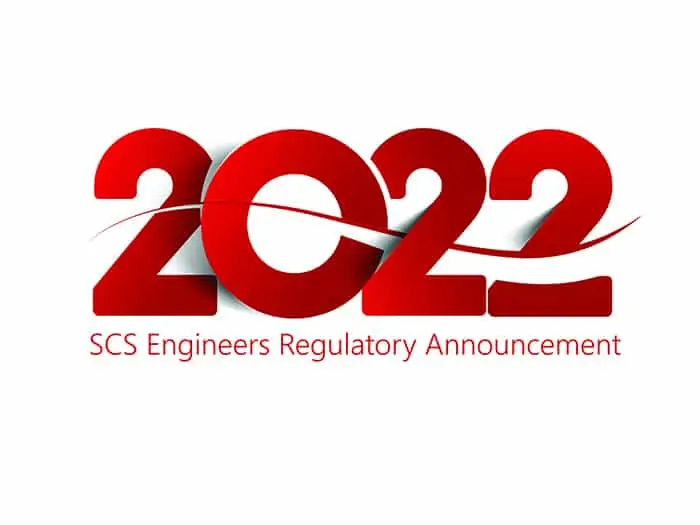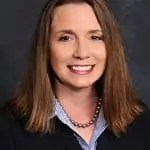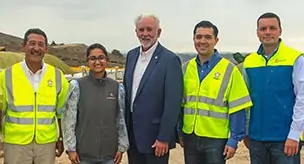

SCS Engineers is hosting our 2023 Solid Waste Seminars on March 10 in Roanoke, Virginia, and on March 17 in Richmond, Virginia. Registrants have the option of attending the Richmond seminar virtually ($100).
This half-day seminar is designed to provide updates on the latest regulatory, policy, and technological developments in the solid waste, landfill, landfill gas, and sustainable materials management industries. The sessions are presented by experienced SCS professionals, and continuing education units are available.
This year, our professionals will cover these important topics:
Lunch will be provided.
The seminar is intended for solid waste management professionals, landfill managers, waste/recycling managers, supervisors, and operators. For attendees already possessing solid waste management and disposal experience, topics will provide a fresh perspective and cover important regulatory and technological updates. For those new to the field, topics will cover essential information on various critical aspects of waste/ recycling program collections, transfer, processing, and disposal, as well as landfill development, operations, monitoring, and management
We look forward to seeing you there!
SCS Engineers is hosting our 2023 Solid Waste Seminars on March 10 in Roanoke, Virginia, and on March 17 in Richmond, Virginia. Registrants have the option of attending the Richmond seminar virtually ($100).
This half-day seminar is designed to provide updates on the latest regulatory, policy, and technological developments in the solid waste, landfill, landfill gas, and sustainable materials management industries. The sessions are presented by experienced SCS professionals, and continuing education units are available.
This year, our professionals will cover these important topics:
Lunch will be provided for in-person attendees.
The seminar is intended for solid waste management professionals, landfill managers, waste/recycling managers, supervisors, and operators. For attendees already possessing solid waste management and disposal experience, topics will provide a fresh perspective and cover important regulatory and technological updates. For those new to the field, topics will cover essential information on various critical aspects of waste/ recycling program collections, transfer, processing, and disposal, as well as landfill development, operations, monitoring, and management
We look forward to seeing you there!
The Recycling Association of Minnesota (RAM) and the Solid Waste Association of North America Land of Lakes Chapter are hosting their annual Conference & Show April 25 & 26 at the Mystic Lake Center in Prior Lake, MN.
The RAM/SWANA Conference & Show continues to be the premier recycling and waste management conference in the Upper Midwest.
RAM/SWANA Conference topics include Hazardous Waste, Recycling, Solid Waste, Food Waste Diversion, and Sustainability. Continuing Education Credits are available, and there always are numerous networking opportunities. Several SCS Engineers professionals are attending the conference – we hope to see you there!

EPA will be accepting applications for both programs through January 16, 2023.
The SWIFR Grant Program provides $275 million over five years for states, municipalities, and tribes to:
The Recycling Education and Outreach Grant Program provides $75 million over five years to states, municipalities, tribes, non-profit organizations, and public-private partnerships to:
Nena Shaw, EPA Acting Director for the Resource Conservation and Sustainability Division, will speak about the grant programs and related EPA waste-related initiatives during her keynote presentation at WASTECON 2022 on Thursday, December 8, in San Diego, California.
Note that $100 million of this funding is available to help build and transform solid waste infrastructure, manage materials to achieve a circular economy, reduce greenhouse gas emissions, and create cleaner, resilient, and healthier communities through composting and organics management programs.
Please contact your SCS program manager or one of our national experts to learn more or get support with your application. We’re always here to help.
Meet SCS Engineers and SCS Field Services professionals at BOOTH 1704 at WasteExpo 2023, May 1-4, in New Orleans.
WasteExpo is the place to be! The conference program is your professional development opportunity of the year! The education and training that you’ll receive is guaranteed to sharpen your skills to help you do your job better. WasteExpo’s conference program is unparalleled. 2023 Conference Tracks include:

Monday, May 1
8:00 AM – 9:15 AM
Room: 275, Session Number: MTECH1

Monday, May 01, 2023
8:30 AM – 9:45 AM
Room: 279, Session Number: MRECYC1

Monday, May 01, 2023
10:15 AM – 11:30 AM
Room: 279, Session Number: MRECYC2

Tuesday, May 02, 2023
8:00 AM – 9:15 AM, Room: 289, Sustainability Track
Seizing an Opportunity: The Rise of MRF Investments with Bob Gardner, Sr. VP Solid Waste
Tuesday, May 02, 2023
12:00 PM – 1:15 PM
Room: 279, Session Number: TRECYC3

Wednesday, May 03, 2023
10:45 AM – 12:00 PM
Room: 275, Session Number: WTECH2
Click for more conference details and registration information
The Food DROP and RecycleSmart case studies in this EM article illustrate the successful collaboration between local governments and stakeholders in food recovery. In both cases, local government staff invested time to understand the barriers and benefits of different aspects of recovery. The resulting recovery programs provide local benefits by supporting the community and the collective benefit of reducing the amount of food waste sent to landfills in California.
As environmental professionals, we believe that positions us as key collaborators for these recovery programs across the country, whether helping businesses overcome the barriers and participate in food donation programs or to support the capacity expansion of recovery organizations and services. We encourage you to learn more about the food recovery organizations and services in your community and start a conversation about how to best support their work.
Start by reading the article, Collaboration Is the Key to Successful Edible Food Recovery, for advice from these SCS Engineers environmental professionals.
In October, Republic Services’ Otay Compost Facility at the Chula Vista, California, Otay Landfill opened for business. The compost facility helps communities in San Diego County meet the requirements of California’s SB1383 law mandating the diversion of organic waste from landfills.
The composting facility designed by SCS Engineers in collaboration with Sustainable Generation operates completely off the grid using solar energy. It is the first fully solar-powered compost facility in the state and can process 100 tons of organics per day, with plans to double capacity by year-end.
Both organics recycling and reuse leaders, Republic Services hired SCS Engineers to design the Otay Compost Facility. The design uses renewable energy to run 100 percent of the composting operations at the site. The facility design includes using technologies to speed the maturation rates and reduce excessive odors. Blowers to aerate the organic material, oxygen and temperature sensors, and advanced compost cover technology produce a high-quality product.

“Republic’s taken the goals of SB 1383, to reduce emissions of short-lived climate pollutants further. They’re running a sustainable facility that enables residents, businesses, and government to easily reuse and recycle more within a smaller carbon footprint than ever expected,” says Vidhya Viswanathan, engineer and project director.
As California collects and recycles organic materials from homes and businesses, local governments will use the products made from recycled organic material for compost and mulch. Recycling organic waste into compost creates a nutrient-rich soil amendment, preserving natural resources and reducing water consumption working within a circular economy. This California jurisdiction is ready for the SB1383 deadline on January 1, 2022.
“Republic Services supports California’s effort to divert food and yard waste from landfills to facilities such as this one,” said Chris Seney, Republic’s director of organics operations. “We’re grateful to SCS for their partnership in helping us bring this facility, co-located at an active landfill, to reality.”
Please watch the YouTube video to see the facility and learn more about its environmental value.
SCS Engineers is proud of helping our municipal and private clients bring the most value to their environmental solutions and communities. To learn more about SCS Engineers, view our 50th-anniversary video.
The engineer in Ryan Duckett tends to want to build the biggest, most top-of-the-line waste and recycling facilities whenever he can, but always what is practical for his clients. SCS’s mission states that employees adopt our clients’ environmental challenges as our own, and that includes their budgets and social goals as well.
“I appreciate that the waste management enterprises I work with are businesses and care about more than the engineering of a project. They care about the economics, and they look for guidance in both realms to get maximum value and efficiency,” says Duckett, who came to SCS Engineers as a new environmental engineering graduate. Then he went back to school for his MBA. He wanted to join both the technical and financial puzzle pieces.
“Everyone, especially local governments, is constrained by tight budgets. You have to think about the interplay between design and construction and financial feasibility,” he says.
That’s his job – to plan technically sound programs and facilities, whether new builds, upgrades, or changes in operations or services. Or it can be developing protocols for clients to tap into low-carbon fuel credits.
He’s learned to look through both developers’ and operators’ eyes to help clients accomplish what they want at budget levels they set while maximizing what they get from their programs, facilities, and systems.
“You need to make assessments and quantify details to answer questions like, what would an operator have to charge for a given service to break even? Is this service fee reasonable given market conditions? What are estimated operational costs and capital costs for an expansion? Financial analysts vet these questions, but very few of them are intimately involved in solid waste practices or engineering,” Duckett says.
A holistic approach in play
He calls the work he does integrated solid waste management, which involves understanding the entire operation and how one component affects the other, whether routing and collections, materials recovery facilities (MRFs), transfer stations, landfill gas systems, or others.
Duckett shows this holistic approach in play by explaining how grasping the way collections work helps design transfer stations. These major builds can run up to multimillions, even when project managers have the skill set and foresight to plan for efficiency and sustainability.
“You can better estimate how to design queuing space, how to design surge capacity, how to size facilities,” he explains.
“Adding, for example, an extra day’s storage capacity at a transfer station or MRF provides extra flexibility in the event of a disruption farther down the line. In an emergency, owners could potentially save significantly by having more time to identify or negotiate more economical alternatives.”
Some of the solutions he finds are simple but require thinking out of the box—literally in one situation where cardboard boxes were stockpiling at a convenience center because they didn’t fit through the slot in a single-stream receptacle. Simply creating an acceptance area only for boxes diverts multiple truckloads a week from landfills and generates thousands a year in revenue.
Then there are the major construction projects where Duckett digs deeper, such as one plan to site, design, and build a MRF. He conducted a feasibility study looking at different sites and calculated estimated operational costs and upfront capital costs for each identified site.
“We ultimately determined that by co-locating a facility at the existing landfill, the client would save over $200,000 in operating costs, with savings from scales/scale house reuse, the reduced distance of residual stream hauling, labor efficiencies, and other areas.”
In this same scenario, adding robotics for additional processing comes with anticipated savings of about $300,000 in manual sorting costs annually.
When do you recommend spending more upfront?
This question often comes up in Duckett’s world.
He finds that sometimes spending more upfront and on what’s built to last translates to substantial savings in the long run. He reflects on when a client had to replace a transfer station floor every couple of years.
“These floors take so much impact, so this is not an uncommon problem. But you can provide a huge ROI by reducing floor replacement frequency. They can run over half a million to replace properly, even for relatively small facilities,” Duckett says.
He ran budget numbers for different approaches and found in this scenario the higher-end approach, cement with additives such as fly ash, was the better deal.
“It might cost 50 percent more upfront, but the floor could last three times as long, breaking the cycle of frequent, costly replacement,” he says.
What do you recommend when budgets are so tight, there’s no cash reserve to invest?
Duckett and his team have found solutions in this scenario, too; often, the strategy is to figure out if a phased approach is possible.
“You could spend ten years waiting to generate enough funds to build infrastructure for a major project. Your citizens are missing out, so sometimes it’s best to build smaller, as soon as you need it. Then increase capacity as you can afford it.”
Expert advice from his colleagues
A very positive thing about his holistic approach is that Duckett can reach out to his colleagues who specialize in long-term financial management plans for utilities such as solid waste. This team, led by Vita Quinn, specializes in helping clients build sustainable financing models and plans.
The models help communities manage financial impacts such as COVID disruptions; make investments without burdening community budgets, and help take advantage of commodity market swings such as in the value of recycled paper. Models are useful to show community leaders and citizens the different options and what-if scenarios that make sense based on current and future conditions.
Going back to the drawing board to improve a system
Not long ago, Duckett’s team had to figure out what to do about a decal-based, pay-as-you-throw system that wasn’t working. The operator’s initial plan seemed logical and simple: residents purchase decals and place them on their bins for pick up. But some of them let their subscriptions expire. The city was losing money servicing outstanding accounts. It hired enforcement officers to check every decal for validity, which soon proved too labor-intensive.
“We found an alternative: adding fees for trash and recycling to the water and sewer bill. It’s bringing in more revenue. And the city is saving on hours spent checking thousands of decals, freeing the enforcement officers for other jobs, like bulky and yard waste enforcement,” Duckett says.
Duckett’s greatest lessons learned?
“In my seven years on the job, I have learned that the solid waste industry is complicated with a lot of intricate, moving parts that interconnect. Who would have thought trash was so complex?”
He’s also learned it’s critical to have comprehensive teams with diverse backgrounds to gather different perspectives.
“It goes back to the concept that you need more than engineering expertise to deliver that value add. That value add is important to our customers, so we strive to understand the business challenge along with the technical and social goals.”
Speaking as a young professional to other young professionals and students thinking about careers in waste management, he says: Check it out. Give it serious thought.
“I do not know of another industry that involves so many interesting disciplines: biology, hydrology, geology, engineering … even data and computer scientists.”
He shares this proposition for the young and ambitious:
“As technology advances and regulatory requirements heighten, our teams learn a lot on the job. But we appreciate our sharp graduates who bring the latest knowledge from academic settings. We depend on them to share new ways of thinking and help us solve challenging and intriguing problems.”
His motivation to get into environmental engineering evolved from his passion for the outdoors.
“I grew to appreciate conservation, which centers on doing more with less to preserve resources. Nothing is wasted in nature; everything is cyclical and gets used,” Duckett says.
“That’s what our waste system could emulate, and as a nation, we’re moving in that direction. It’s not just about reducing trash. It’s about reducing wasted effort and money spent beyond what’s necessary. It goes back to the idea of efficiency and getting the most out of something – instead of a using-disposing-buying new mentality.”
Learn more about comprehensive MRF and Transfer Station infrastructure
We all enjoy a success story, especially when it comes to reducing contamination in recyclable materials. Congratulations to the city and citizens for their Clean/Green campaign with its many benefits. Bill Bensing, Director of Public Services in Kirkwood, takes us through his journey in this timely APWA Reporter article.
Additional Resources:
As it does nationwide, Florida’s aspirational 75% recycling goal presents unique challenges and opportunities. Specifically, Florida municipal policymakers and professional staff are wrestling with contamination and changing global commodity markets that affect the financial viability of their recycling programs…
The Wisconsin Department of Natural Resources – WDNR is performing a waste sort to determine what’s in the trash going into Wisconsin’s landfills. During the waste audit, the team will collect at least 200 samples of waste from 12 waste disposal sites across the state for eight weeks. It’s a dirty …
Cities have begun to “right-size” their recycling systems by evaluating the usage of community recycling containers and reducing/redistributing containers to maximize the quantity of recyclables each site receives. Communities are evaluating curbside recycling programs to increase efficiency, and decreasing contamination is a priority…
The Dallas City Council recently authorized a three-year service contract, with two one-year renewal options, for environmental monitoring and engineering consulting services supporting Dallas’s Department of Sanitation Services. SCS Engineers will use its integrated specialized practices to support the City’s McCommas Bluff Sanitary Landfill, Bachman Transfer Station, Fair Oaks Transfer Station, and Southwest Transfer Station.
Vice President Ryan Kuntz, P.E., the team’s principal consulting engineer, said, “SCS is privileged that the City of Dallas entrusts us to partner with the City’s staff to maintain the landfill and the transfer stations’ safe and efficient operations. The Department of Sanitation Services support the citizens and the environment; we’re honored to be of assistance.”
Landfills are extraordinarily complex systems integrating liquids and gas management systems, and the City’s McCommas Bluff Landfill is one of the largest landfills in the State of Texas. Transfer stations also require expertise in technical and regulatory issues for successful operation.
The City finds it cost-effective to employ an engineering firm, such as SCS, that specializes in solid waste engineering. SCS enhances environmental services with its specialized in-house practices, providing comprehensive capabilities and advanced technologies that improve efficiency and help control costs.
SCS Engineers will provide monitoring and engineering support staff from the firm’s Bedford, Texas office, along with the help of our minority/women-owned business partners. The SCS Bedford team’s professionals and field technicians are experienced and knowledgeable of regional and local geology, regulatory policies, and technical challenges.
SCS Engineers’ environmental solutions and technology are a direct result of our experience and dedication to solid waste management and other industries responsible for safeguarding the environment. For more information about SCS, please watch our 50th Anniversary video.